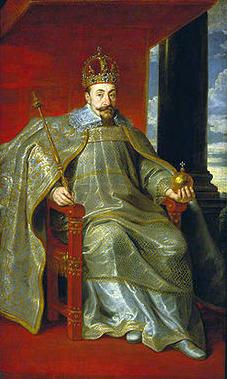 On February 21 back in 1437, King James I of Scotland was assassinated. If you read about his life, you’re probably wondering why it took so long.
On February 21 back in 1437, King James I of Scotland was assassinated. If you read about his life, you’re probably wondering why it took so long.
He actually made it to age 42 despite his brother being murdered by his uncle, spending 18 years as a prisoner of the English (for whom he fought against France during that period), taxing heavily, taking some Scots nobles hostage and executing others, stealing public money and all that.
His son and successor, James II, was killed by an exploding cannon, after 23 eventful years dodging plots or engaging in them. He was 29 when he died.
His son and successor, James III, was killed in battle (or just possibly assassinated after it), after 28 years of ruling badly, twisting justice and quarreling with his own family, possibly having one of his brothers murdered, and spending part of his reign a prisoner of disaffected nobles. He was 36 when he died.
His son and successor, James IV, described by Wikipedia as “generally regarded as the most successful of all the Stewart monarchs of Scotland” was killed in the disastrous battle of Flodden field on September 9, 1513. He is the last monarch of Scotland, or anywhere in Great Britain, to be killed in battle. At age 40.
His son and successor, James V, died shortly after a catastrophic defeat at the Battle of Solway Moss in December 1542, either from a nervous breakdown or just one of those things. He was 30 when he died.
So, who wants to be next? And why would you call him James?
Actually they didn’t. They went with James V’s daughter “Mary Queen of Scots” whose turbulent life included marriage to the French dauphin (he died) and her first cousin Lord Darnley (he was murdered) and James Hepburn, 4th Earl of Bothwell (who apparently murdered Darnley), fleeing south from a revolt to seek the protection of her first cousin once removed Elizabeth I (Mary’s grandmother was Henry VIII’s sister, don’t you see?) whose throne she had previously claimed, spending 18 and a half years in custody then being executed for plotting to assassinate Elizabeth at age 44.
So at that point they went with another James, Mary’s son, dubbed “the wisest fool in Christendom” by the cunning French king Henri IV (assassinated in 1610 aged 56), who actually contrived to become king James I of England and die peacefully in bed at age 58, setting the stage for his own son Charles’ disastrous reign ending in execution by the English.
What is amazing about this brutal soap opera is that a crucial factor is all kinds of people’s determined, even desperate, as well as devious efforts to secure the throne of Scotland. Och aye, it’ll be greet, I’ll be king, I’ll have fancy food, pretty mistresses, a big pile of actual wood for my fire and… a dagger in my wame.
Why not just throw yourself off a high point at Sterling Castle right away and save everyone including yourself a lot of trouble?






